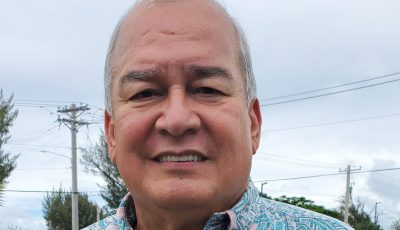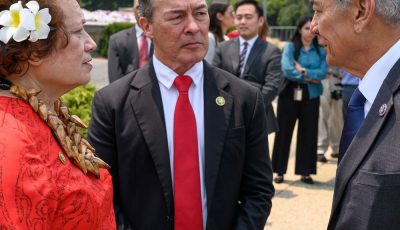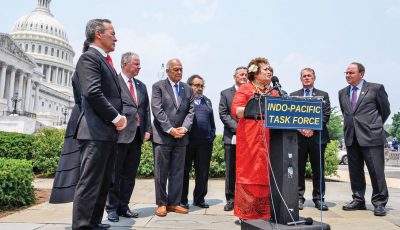CITING DVA ANNUAL REPORT
Veteran suicides plummeted to lowest level since 2006—Kilili
Veteran suicides have plummeted to their lowest level since 2006, according to Delegate Gregorio Kilili C. Sablan (Ind-MP), citing a recent report from the U.S. Department of Veterans Affairs.
Sablan also disclosed in his e-kilili newsletter over the weekend that the Economic Development Administration awarded the Commonwealth Economic Development Authority $440,000 last week to examine the growth and economic feasibility of the Tinian Beef Cattle Industry and provide technical support to the Tinian Cattlemen Association.
He said the project aims to provide a roadmap to attract private investment and advance economic resiliency in the Marianas.
Sablan also disclosed that the Interior Department announced Thursday last week that the CNMI is receiving $1.9 million in Compact Impact funds.
On veteran suicides, the delegate said the U.S. House of Representatives Committee on Veterans Affairs reviewed the DVA’s 2022 National Veteran Suicide Prevention Annual Report at a hearing on what works to prevent veteran suicides.
Sablan said the decrease in veteran suicides came despite the COVID-19 pandemic, which mental health professionals said could possibly create “a perfect storm of increased veteran suicide rates.”
He said the lessening of the veterans’ suicide rate coincided with the DVA’s launch in 2018 of a National Strategy for Preventing Veteran Suicide that included measures such as a telephone hotline for veterans experiencing suicidal thoughts.
“You can call the hotline for the Marianas. Dial 988, then press 1 for the National Veterans Crisis Line,” the delegate said.
According to the 2022 National Veteran Suicide Prevention Annual Report, in 2020, there were 6,146 veteran suicides, or an average of 16.8 per day. In 2020, there were 343 fewer veteran suicides than in 2019, and the number of veteran suicides was lower than each year since 2006.
From 2001 through 2018, the number of veteran suicides increased on average by 47 deaths per year.
From 2019 to 2020, there were consecutive reductions, of 307 and 343 suicides, respectively, showing an unprecedented decrease since 2001.
From 2018 to 2020, age-and sex-adjusted rates for veterans fell by 9.7%. The report noted that this was a larger percentage decrease than was observed for non-veteran U.S. adults (5.5%).
In 2020, adjusting for population age and sex differences, the suicide rate for veterans was 57.3% greater than for non-veteran U.S. adults.
The pandemic was announced in early March 2020. By the year’s end, COVID-19 was the third-leading cause of deaths in the U.S., both overall and for veterans.
Despite the pandemic, the veteran suicide rate in 2020 continued a decline that began in 2019.
Comparisons of trends in veteran suicide and COVID-19 mortality over the course of 2020, and across veteran demographic and clinical subgroups, did not indicate an impact of the COVID-19 pandemic on veteran suicide mortality, according to the report.
On Compact Impact, Sablan said the total funding includes $1,652,879 in Compact Impact mandatory funding and $275,480 in discretionary funding.
He said that in July, the CNMI government submitted proposals for the use of the funds to offset costs associated with providing education, health, and safety-related services to migrants from the freely associated states of Palau, the Marshall Islands, and the Federated States of Micronesia.
Provided for under the Compact of Free Association, as amended, U.S. Public Law 108-188, mandatory funding is made available to each of these eligible governments to help defray costs associated with increased demands on health, education, and social services, or infrastructure related to such services provided to individuals who have migrated from the freely associated states to these U.S. jurisdictions.
Under current law, mandatory Compact Impact funding provided to affected jurisdictions—CNMI, Guam, Hawaii, and American Samoa—under U.S. Public Law 108-188, ends in fiscal year 2023.




























